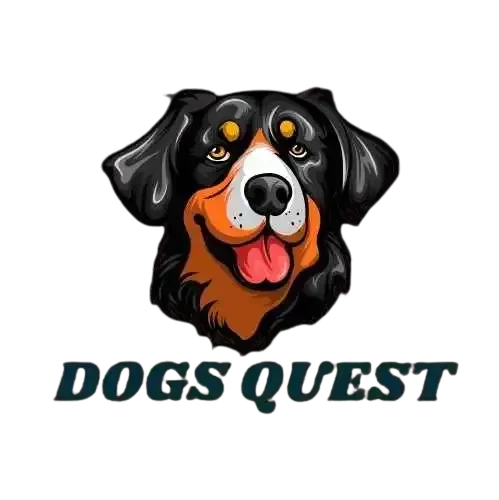our puppy’s health starts here! Follow this complete puppy needle schedule to ensure perfect protection and a happy, healthy start to life.
Introduction
Bringing home a new puppy is an exciting time filled with love, energy, and joy. But behind all that cuteness comes a big responsibility — keeping your puppy safe and healthy. One of the most crucial parts of early puppy care is following the puppy needle schedule. Vaccines protect your pup from serious diseases, help their immune system grow stronger, and ensure a long, healthy life.
Many new dog owners underestimate how important the puppy needle schedule is. Missing even a single vaccination or delaying a shot can leave your puppy vulnerable to dangerous infections. This guide will walk you through everything you need to know — from what vaccines your puppy needs to how often they should get them, how much they cost, and what side effects to expect. Let’s make sure your furry friend starts off with the best possible protection.
What Is a Puppy Needle Schedule?
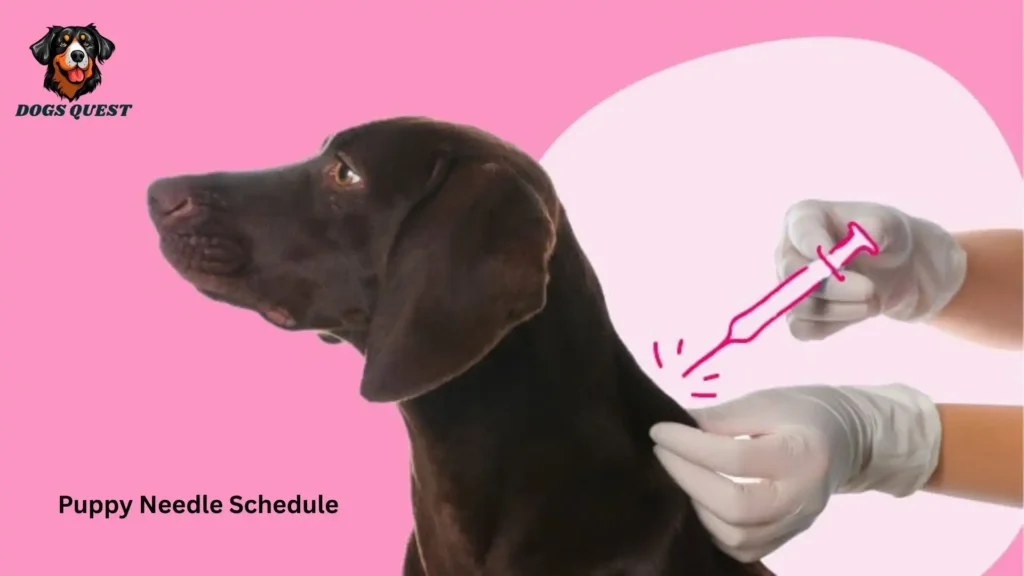
A puppy needle schedule is a timeline that shows when your puppy should receive specific vaccines to build immunity against common diseases. Just like human babies, puppies are born with weak immune systems. They get some protection from their mother’s milk, but it fades after a few weeks. Vaccines help replace that natural immunity with stronger, long-lasting protection.
The puppy needle schedule is carefully structured to give shots at the right time when your puppy’s body is ready to develop an immune response. Following this schedule means each vaccine works effectively without overloading the immune system.
Why Following the Puppy Needle Schedule Is Essential
Vaccines teach your puppy’s body how to recognize and fight off infections. They don’t cause illness but instead prepare the immune system to respond quickly if exposed to real viruses or bacteria later in life. Without vaccination, a puppy can easily catch life-threatening diseases such as parvovirus, rabies, or distemper.
A complete puppy needle schedule ensures your dog is safe from these threats. It’s also legally required in many areas, especially for rabies vaccination. Beyond protection, vaccines help prevent the spread of diseases in communities, creating a safer environment for all pets.
The Complete Puppy Needle Schedule by Age
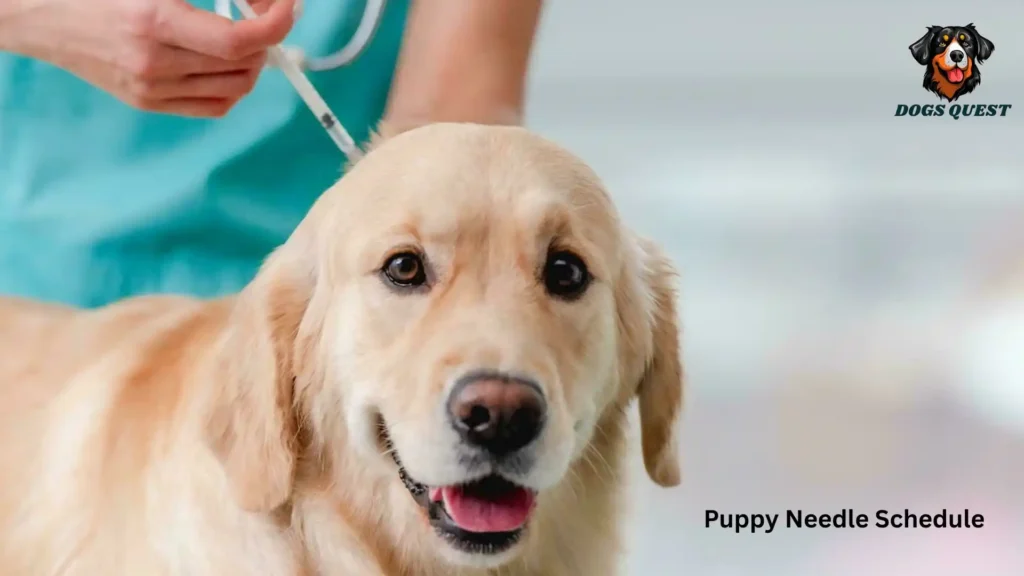
The following timeline is the most commonly recommended puppy needle schedule used by veterinarians worldwide.
6–8 Weeks Old: First Vaccines
At this age, your puppy begins their first set of shots.
- DHPP (Distemper, Hepatitis, Parainfluenza, Parvovirus): This combination vaccine protects against four highly contagious diseases that can be fatal.
- Bordetella (Optional): Protects against kennel cough, especially important if your puppy will be around other dogs.
This first round starts your puppy’s foundation for a healthy immune system and marks the beginning of the puppy needle schedule.
10–12 Weeks Old: Second Round of Shots
The next step in the puppy needle schedule involves booster shots to reinforce immunity.
- DHPP Booster: Strengthens protection from the initial round.
- Leptospirosis (Optional): For puppies in areas where there’s standing water or wildlife that may carry the bacteria.
Sticking to the schedule at this stage prevents gaps in immunity that could make your puppy vulnerable.
14–16 Weeks Old: Final Core Vaccinations
At this stage, your puppy’s immune system is strong enough to handle the final set of early-life vaccines.
- DHPP Final Booster: Completes the core series, ensuring strong immunity.
- Rabies Vaccine: Essential and legally required in most countries. Rabies is fatal but preventable with this vaccine.
This is one of the most critical points in the puppy needle schedule, completing your puppy’s initial protection phase.
12–16 Months Old: Annual Boosters
Once your puppy turns one, it’s time for the first annual boosters.
- DHPP Booster: Maintains ongoing protection.
- Rabies Booster: Keeps rabies immunity strong and legally compliant.
From here, vaccines are typically repeated once every year or three years depending on your vet’s advice and the vaccine brand.
Understanding Core and Non-Core Vaccines
Not all vaccines are mandatory for every dog, but some are absolutely essential. The puppy needle schedule includes both core and non-core vaccines.
Core Vaccines are necessary for all dogs regardless of breed, environment, or location:
- Canine Distemper
- Canine Parvovirus
- Canine Adenovirus (Hepatitis)
- Rabies
Non-Core Vaccines depend on exposure risk and living conditions:
- Bordetella (Kennel Cough)
- Leptospirosis
- Lyme Disease
- Canine Influenza
Your vet will recommend which non-core vaccines are right for your dog based on their lifestyle and region.
How Puppy Vaccines Work
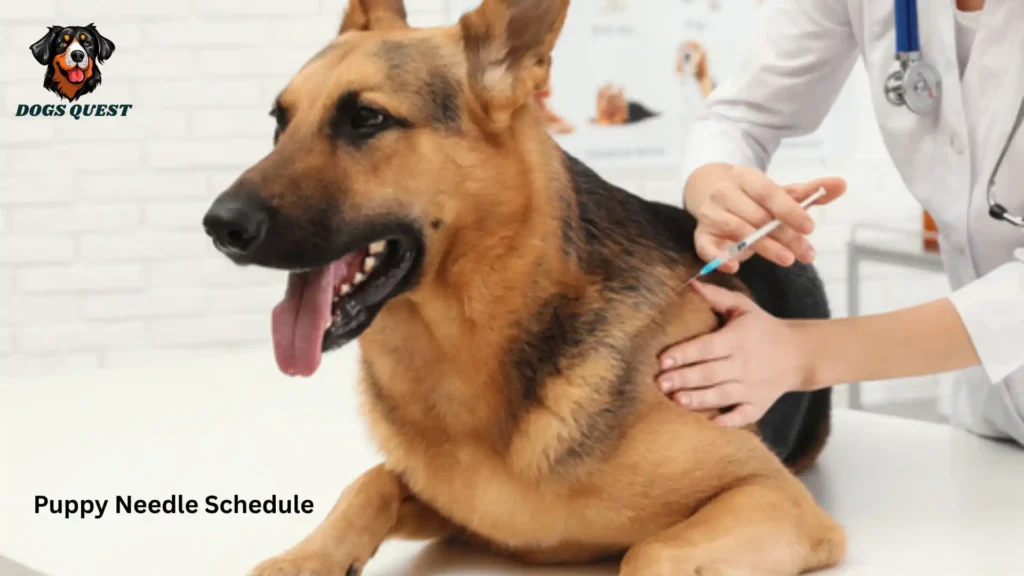
Vaccines trigger the puppy’s immune system to produce antibodies. These antibodies stay in the body and remember how to fight the disease if it appears again. A well-timed puppy needle schedule makes sure each vaccine builds upon the last one, resulting in a strong defense system by the time your puppy reaches adulthood.
Missing or delaying a dose can interrupt this process and leave gaps in immunity, which is why sticking to the puppy needle schedule exactly is so important.
Common Diseases Prevented by the Puppy Needle Schedule
Canine Parvovirus
A highly contagious and often deadly virus that causes severe vomiting, diarrhea, and dehydration.
Distemper
Affects the respiratory and nervous systems, often leading to seizures or death.
Rabies
Fatal to both dogs and humans, rabies is spread through bites from infected animals.
Hepatitis (Adenovirus)
Damages the liver and causes fever, vomiting, and pain.
Parainfluenza
Leads to coughing and respiratory infections, especially in multi-dog environments.
Following the puppy needle schedule protects your pet from all of these devastating diseases.
Cost of Following the Puppy Needle Schedule
The total cost of completing a puppy needle schedule varies by location, clinic, and vaccine type.
- Individual vaccines cost between $20 and $50.
- The full set of core vaccinations usually costs around $150–$300.
Though it may seem expensive initially, it’s a small price compared to the thousands it might cost to treat a sick puppy suffering from preventable diseases.
What to Expect After Each Vaccine
After vaccination, it’s normal for your puppy to feel a little tired or have mild swelling at the injection site. Other minor symptoms may include:
- Slight fever
- Temporary loss of appetite
- Mild soreness or sleepiness
These effects last only a day or two. However, if your puppy experiences vomiting, difficulty breathing, or facial swelling, contact your vet immediately. Always monitor your puppy for 24 hours after each shot in the puppy needle schedule.
Keeping Accurate Vaccination Records
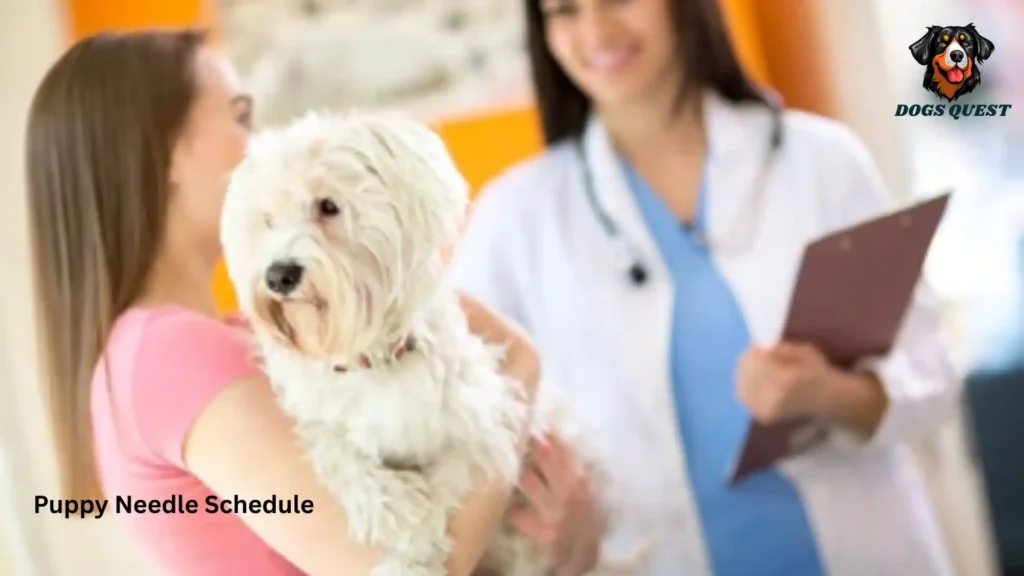
Always keep a vaccination log for your puppy that lists:
- The vaccine name
- The date it was given
- The next due date
- The vet’s signature or clinic name
This record is essential for travel, grooming, training, and boarding. It also helps your vet maintain an accurate puppy needle schedule and make future recommendations.
Myths About Puppy Vaccines
Myth 1: Indoor dogs don’t need vaccines.
Even indoor puppies can be exposed to viruses brought in by shoes or visitors. The puppy needle schedule protects them regardless of lifestyle.
Myth 2: One vaccine lasts forever.
Immunity fades over time. Regular boosters keep protection strong throughout your dog’s life.
Myth 3: Vaccines are risky.
Side effects are rare and minor. The benefits of vaccination far outweigh any small risks.
How to Keep Your Puppy Calm During Vaccinations
Puppies can be anxious during vet visits. Here’s how to make it easier:
- Stay calm — your puppy senses your emotions.
- Bring their favorite toy or treat.
- Reward them immediately after the visit.
Positive reinforcement builds trust and ensures your puppy doesn’t fear future appointments. Since the puppy needle schedule includes multiple visits, keeping it stress-free helps both you and your pet.
Traveling and Vaccination Requirements
If you plan to travel domestically or internationally with your dog, an updated puppy needle schedule is mandatory. Airlines and border authorities often require proof of rabies and other core vaccinations. Always check travel regulations well in advance to avoid delays or quarantine.
Keeping printed and digital copies of your vaccination record ensures a smooth travel experience.
Customizing the Schedule With Your Vet
Each dog’s lifestyle, breed, and health status can slightly alter the puppy needle schedule. For example, small breeds may need lighter doses or slower spacing, while outdoor dogs might need more frequent boosters. Regular communication with your vet ensures the schedule fits your puppy’s individual needs.
Your vet will also check your puppy’s weight, behavior, and general health at every vaccination appointment to make sure they’re developing properly.
Building a Healthy Routine Beyond Vaccines
Vaccines are just one part of your puppy’s health. Combine the puppy needle schedule with good nutrition, exercise, and grooming. Feed a balanced diet, provide fresh water, and keep up with deworming and flea prevention.
After completing the main vaccination series, start socializing your puppy. Safe interaction with other vaccinated dogs helps your puppy grow into a friendly, confident adult.
Final Thoughts
A proper puppy needle schedule is not just a medical routine — it’s an act of love and care that builds the foundation for your dog’s lifelong health. Vaccines protect your pet from fatal diseases, prevent outbreaks in your community, and give you peace of mind knowing your best friend is safe.
By following your vet’s advice, maintaining records, and keeping up with boosters, you’re giving your puppy the strongest start possible. Every injection brings your pet one step closer to a lifetime of health, happiness, and trust. Stay committed, stay informed, and remember — a healthy dog begins with a well-planned puppy needle schedule.
Frequently Asked Questions:
Q1. What is the puppy needle schedule and why is it important?
The puppy needle schedule is a vaccination timeline designed to protect puppies from deadly diseases like parvovirus, rabies, and distemper. Following it ensures your puppy builds a strong immune system and stays healthy.
Q2. At what age should a puppy get its first vaccine?
According to the puppy needle schedule, puppies should receive their first vaccine at 6 to 8 weeks old. This helps start early protection against common infections and prepares them for later boosters.
Q3. What vaccines are included in the puppy needle schedule?
The puppy needle schedule includes core vaccines like DHPP (Distemper, Hepatitis, Parvovirus, Parainfluenza) and Rabies. Non-core vaccines such as Bordetella, Leptospirosis, and Lyme may be added depending on risk factors.
Q4. What happens if I miss a vaccine in the puppy needle schedule?
Missing a vaccine can interrupt immunity, leaving your puppy exposed to diseases. If you miss a shot in the puppy needle schedule, contact your vet immediately — they’ll adjust or restart the schedule safely.
Q5. Are there side effects to the puppy needle schedule vaccines?
Mild effects like fatigue, slight fever, or soreness are common after shots. Serious reactions are rare. Always monitor your puppy after each vaccine in the puppy needle schedule and contact your vet if symptoms worsen.
